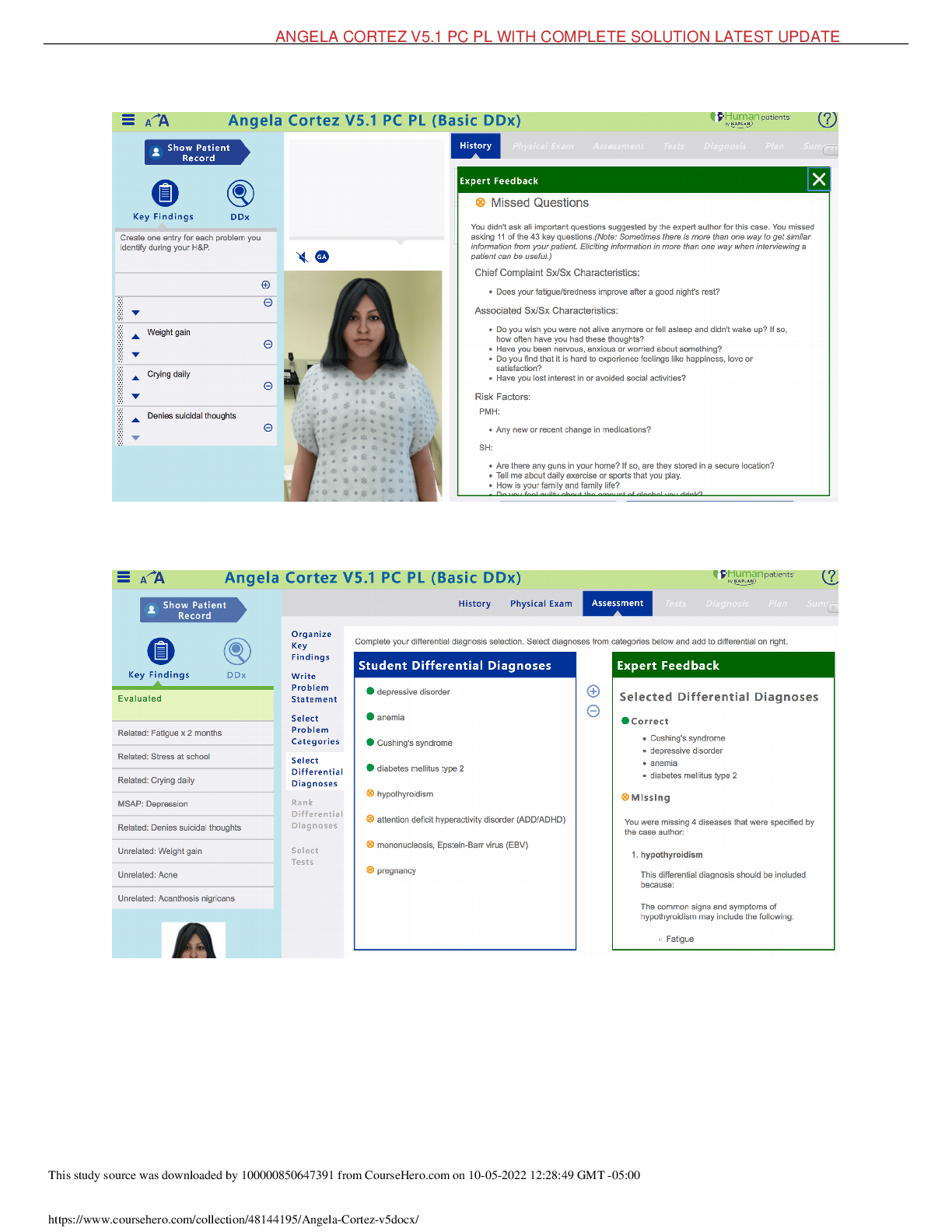TB-Chapter 04 The Complete Health History Questions & Answers
Document Content and Description Below
Chapter 04: The Complete Health History MULTIPLE CHOICE 1. The nurse is preparing to conduct a health history. Which of these statements best describes the purpose of a health history? a. To provide a... n opportunity for interaction between the patient and the nurse b. To provide a form for obtaining the patients biographic information c. To document the normal and abnormal findings of a physical assessment d. To provide a database of subjective information about the patients past and current health ANS: D The purpose of the health history is to collect subjective datawhat the person says about him or herself. The other options are not correct. DIF: Cognitive Level: Understanding (Comprehension) MSC: Client Needs: Safe and Effective Care Environment: Management of Care 2. When the nurse is evaluating the reliability of a patients responses, which of these statements would be correct? The patient: NURSINGTB.COM a. Has a history of drug abuse and therefore is not reliable. b. Provided consistent information and therefore is reliable. c. Smiled throughout interview and therefore is assumed reliable. d. Would not answer questions concerning stress and therefore is not reliable. ANS: B A reliable person always gives the same answers, even when questions are rephrased or are repeated later in the interview. The other statements are not correct. DIF: Cognitive Level: Applying (Application) MSC: Client Needs: Safe and Effective Care Environment: Management of Care 3. A 59-year-old patient tells the nurse that he has ulcerative colitis. He has been having black stools for the last 24 hours. How would the nurse best document his reason for seeking care? a. J.M. is a 59-year-old man seeking treatment for ulcerative colitis. b. J.M. came into the clinic complaining of having black stools for the past 24 hours. c. J.M. is a 59-year-old man who states that he has ulcerative colitis and wants it checked. d. J.M. is a 59-year-old man who states that he has been having black stools for the past 24 hours. ANS: D The reason for seeking care is a brief spontaneous statement in the persons own words that describes the reason for the visit. It states one (possibly two) signs or symptoms and their duration. It is enclosed in quotation marks to indicate the persons exact words. DIF: Cognitive Level: Applying (Application) MSC: Client Needs: Safe and Effective Care Environment: Management of Care 4. A patient tells the nurse that she has had abdominal pain for the past week. What would be the nurses best response? a. Can you point to where it hurts? b. Well talk more about that later in the interview. c. What have you had to eat in the last 24 hours? d. Have you ever had any surgeries on your abdomen? NURSINGTB.COM ANS: A A final summary of any symptom the person has should include, along with seven other critical characteristics, Location: specific. The person is asked to point to the location. DIF: Cognitive Level: Applying (Application) MSC: Client Needs: Safe and Effective Care Environment: Management of Care 5. A 29-year-old woman tells the nurse that she has excruciating pain in her back. Which would be the nurses appropriate response to the womans statement? a. How does your family react to your pain? b. The pain must be terrible. You probably pinched a nerve. c. Ive had back pain myself, and it can be excruciating. d. How would you say the pain affects your ability to do your daily activities? ANS: D The symptom of pain is difficult to quantify because of individual interpretation. With pain, adjectives should be avoided and the patient should be asked how the pain affects his or her daily activities. The other responses are not appropriate. DIF: Cognitive Level: Applying (Application) MSC: Client Needs: Safe and Effective Care Environment: Management of Care 6. In recording the childhood illnesses of a patient who denies having had any, which note by the nurse would be most accurate? a. Patient denies usual childhood illnesses. b. Patient states he was a very healthy child. c. Patient states his sister had measles, but he didnt. d. Patient denies measles, mumps, rubella, chickenpox, pertussis, and strep throat. ANS: D Childhood illnesses include measles, mumps, rubella, chickenpox, pertussis, and strep throat. Avoid recording usual childhood illnesses because an illness common in the persons childhood may be unusual today (e.g., measles). DIF: Cognitive Level: Remembering (Knowledge) MSC: Client Needs: Safe and Effective Care Environment: Management of Care 7. A female patient tells the nurse that she has had six pregnancies, with four live births at term and two spontaneous abortions. Her four children are sNtiUllRliSvIiNngG.THBo.CwOwMould the nurse record this information? a. P-6, B-4, (S)Ab-2 b. Grav 6, Term 4, (S)Ab-2, Living 4 c. Patient has had four living babies. d. Patient has been pregnant six times. ANS: B Obstetric history includes the number of pregnancies (gravidity), number of deliveries in which the fetus reached term (term), number of preterm pregnancies (preterm), number of incomplete pregnancies (abortions), and number of children living (living). This is recorded: Grav Term Preterm Ab Living . For any incomplete pregnancies, the duration is recorded and whether the pregnancy resulted in a spontaneous (S) or an induced (I) abortion. DIF: Cognitive Level: Applying (Application) MSC: Client Needs: Safe and Effective Care Environment: Management of Care 8. A patient tells the nurse that he is allergic to penicillin. What would be the nurses best response to this information? a. Are you allergic to any other drugs? b. How often have you received penicillin? c. Ill write your allergy on your chart so you wont receive any penicillin. d. Describe what happens to you when you take penicillin. ANS: D Note both the allergen (medication, food, or contact agent, such as fabric or environmental agent) and the reaction (rash, itching, runny nose, watery eyes, or difficulty breathing). With a drug, this symptom should not be a side effect but a true allergic reaction. DIF: Cognitive Level: Understanding (Comprehension) MSC: Client Needs: Safe and Effective Care Environment: Management of Care 9. The nurse is taking a family history. Important diseases or problems about which the patient should be specifically asked include: a. Emphysema. b. Head trauma. c. Mental illness. d. Fractured bones. NURSINGTB.COM ANS: C Questions concerning any family history of heart disease, high blood pressure, stroke, diabetes, obesity, blood disorders, breast and ovarian cancers, colon cancer, sickle cell anemia, arthritis, allergies, alcohol or drug addiction, mental illness, suicide, seizure disorder, kidney disease, and tuberculosis should be asked. DIF: Cognitive Level: Remembering (Knowledge) MSC: Client Needs: Safe and Effective Care Environment: Management of Care 10. The review of systems provides the nurse with: a. Physical findings related to each system. b. Information regarding health promotion practices. c. An opportunity to teach the patient medical terms. d. Information necessary for the nurse to diagnose the patients medical problem. ANS: B The purposes of the review of systems are to: (1) evaluate the past and current health state of each body system, (2) double check facts in case any significant data were omitted in the present illness section, and (3) evaluate health promotion practices. DIF: Cognitive Level: Remembering (Knowledge) MSC: Client Needs: Safe and Effective Care Environment: Management of Care 11. Which of these statements represents subjective data the nurse obtained from the patient regarding the patients skin? a. Skin appears dry. b. No lesions are obvious. c. Patient denies any color change. d. Lesion is noted on the lateral aspect of the right arm. ANS: C The history should be limited to patient statements or subjective datafactors that the person says were or were not present. DIF: Cognitive Level: Understanding (Comprehension) MSC: Client Needs: Safe and Effective Care ENnUvRirSoInNmGeTnBt:.CMOaMnagement of Care 12. The nurse is obtaining a history from a 30-year-old male patient and is concerned about health promotion activities. Which of these questions would be appropriate to use to assess health promotion activities for this patient? a. Do you perform testicular self-examinations? b. Have you ever noticed any pain in your testicles? c. Have you had any problems with passing urine? d. Do you have any history of sexually transmitted diseases? ANS: A Health promotion for a man would include the performance of testicular self-examinations. The other questions are asking about possible disease or illness issues. DIF: Cognitive Level: Understanding (Comprehension) MSC: Client Needs: Safe and Effective Care Environment: Management of Care 13. Which of these responses might the nurse expect during a functional assessment of a patient whose leg is in a cast? a. I broke my right leg in a car accident 2 weeks ago. b. The pain is decreasing, but I still need to take acetaminophen. c. I check the color of my toes every evening just like I was taught. d. Im able to transfer myself from the wheelchair to the bed without help. ANS: D Functional assessment measures a persons self-care ability in the areas of general physical health or absence of illness. The other statements concern health or illness issues. DIF: Cognitive Level: Applying (Application) MSC: Client Needs: Safe and Effective Care Environment: Management of Care 14. In response to a question about stress, a 39-year-old woman tells the nurse that her husband and mother both died in the past year. Which response by the nurse is most appropriate? a. This has been a difficult year for you. b. I dont know how anyone could handle that much stress in 1 year! c. What did you do to cope with the lNoUssRoSfINboGthTBy.oCuOr Mhusband and mother? d. That is a lot of stress; now lets go on to the next section of your history. ANS: C Questions about coping and stress management include questions regarding the kinds of stresses in ones life, especially in the last year, any changes in lifestyle or any current stress, methods tried to relieve stress, and whether these methods have been helpful. DIF: Cognitive Level: Applying (Application) MSC: Client Needs: Safe and Effective Care Environment: Management of Care 15. In response to a question regarding the use of alcohol, a patient asks the nurse why the nurse needs to know. What is the reason for needing this information? a. This information is necessary to determine the patients reliability. b. Alcohol can interact with all medications and can make some diseases worse. c. The nurse needs to be able to teach the patient about the dangers of alcohol use. d. This information is not necessary unless a drinking problem is obvious. ANS: B Alcohol adversely inte [Show More]
Last updated: 1 year ago
Preview 1 out of 12 pages

Buy this document to get the full access instantly
Instant Download Access after purchase
Add to cartInstant download
We Accept:

Reviews( 0 )
$17.00
Document information
Connected school, study & course
About the document
Uploaded On
Apr 03, 2021
Number of pages
12
Written in
Additional information
This document has been written for:
Uploaded
Apr 03, 2021
Downloads
0
Views
47

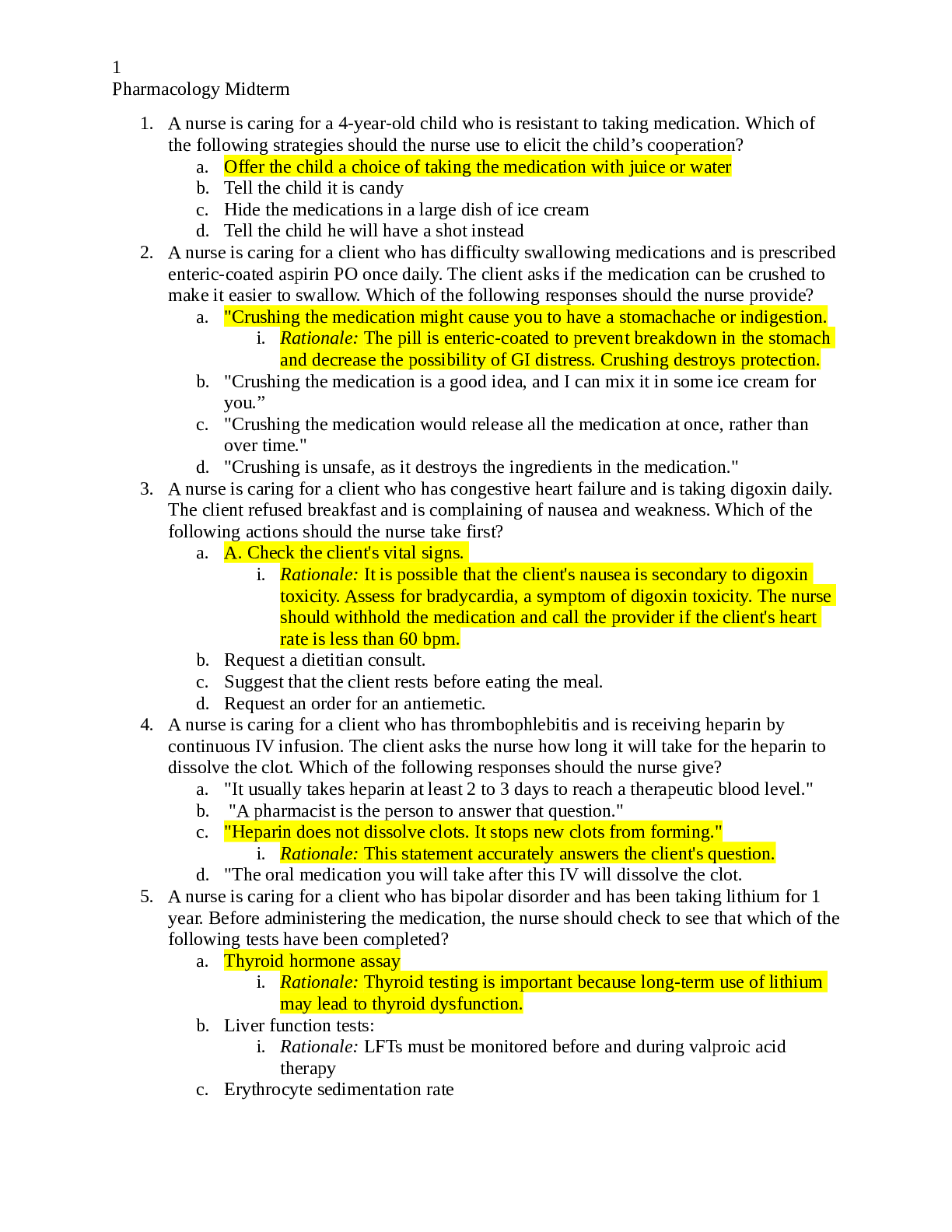
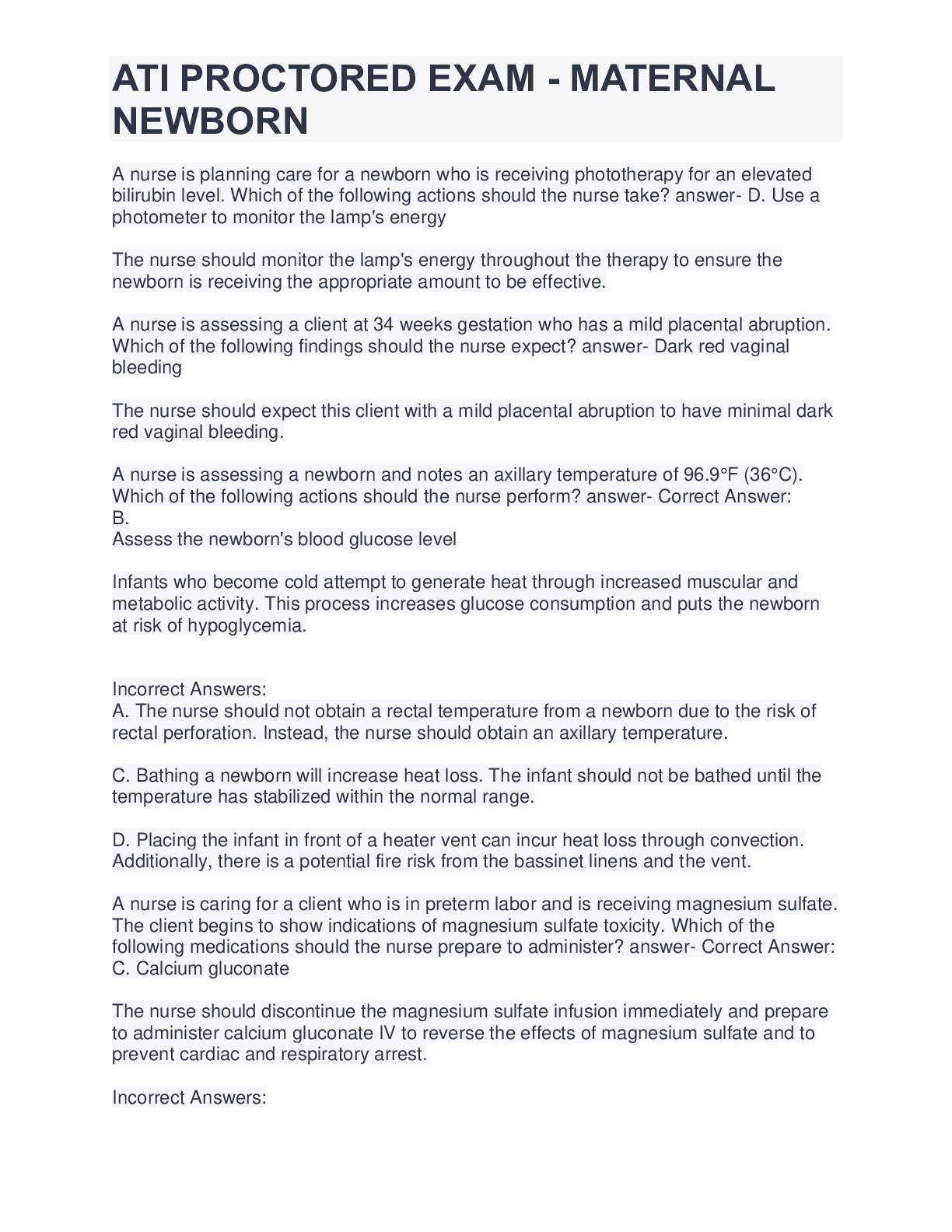
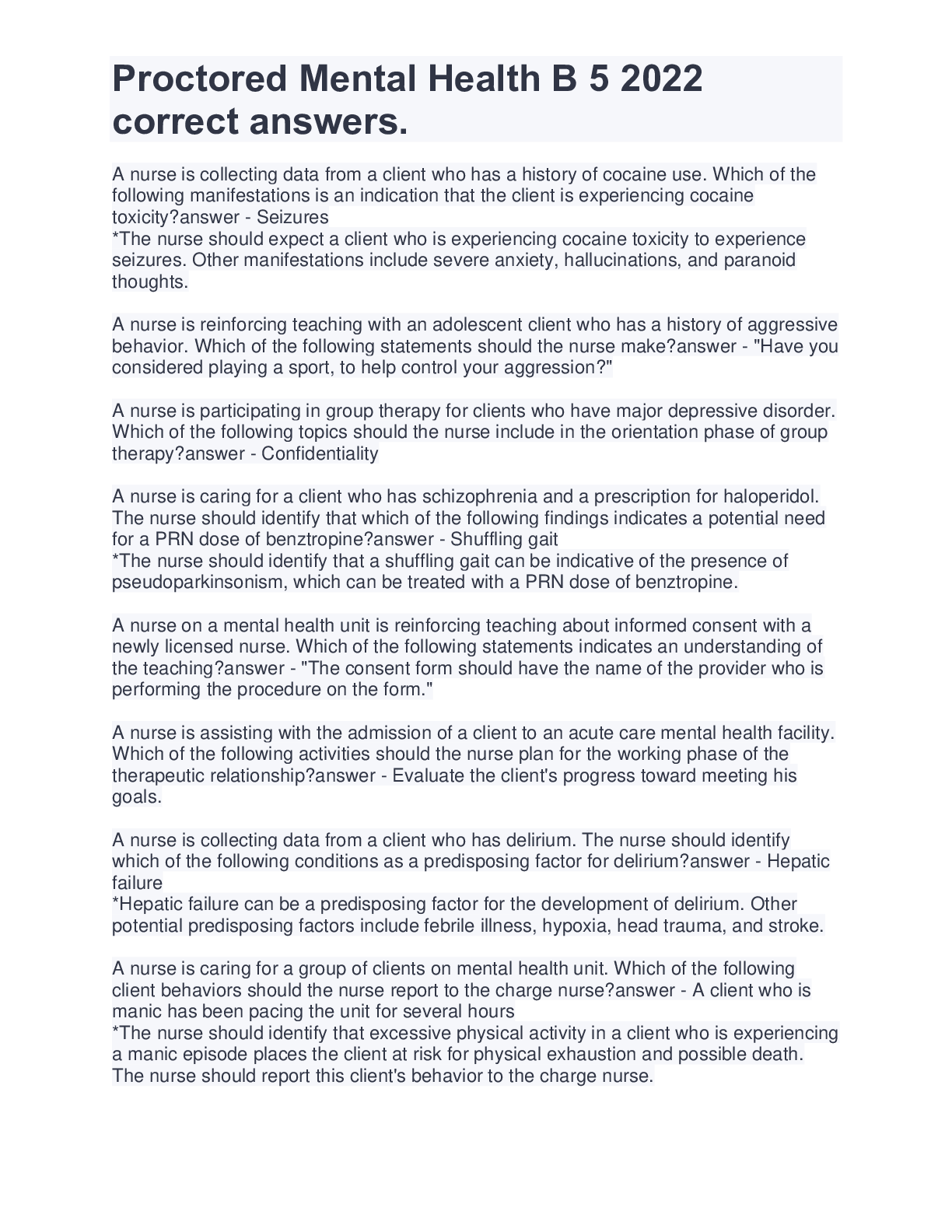
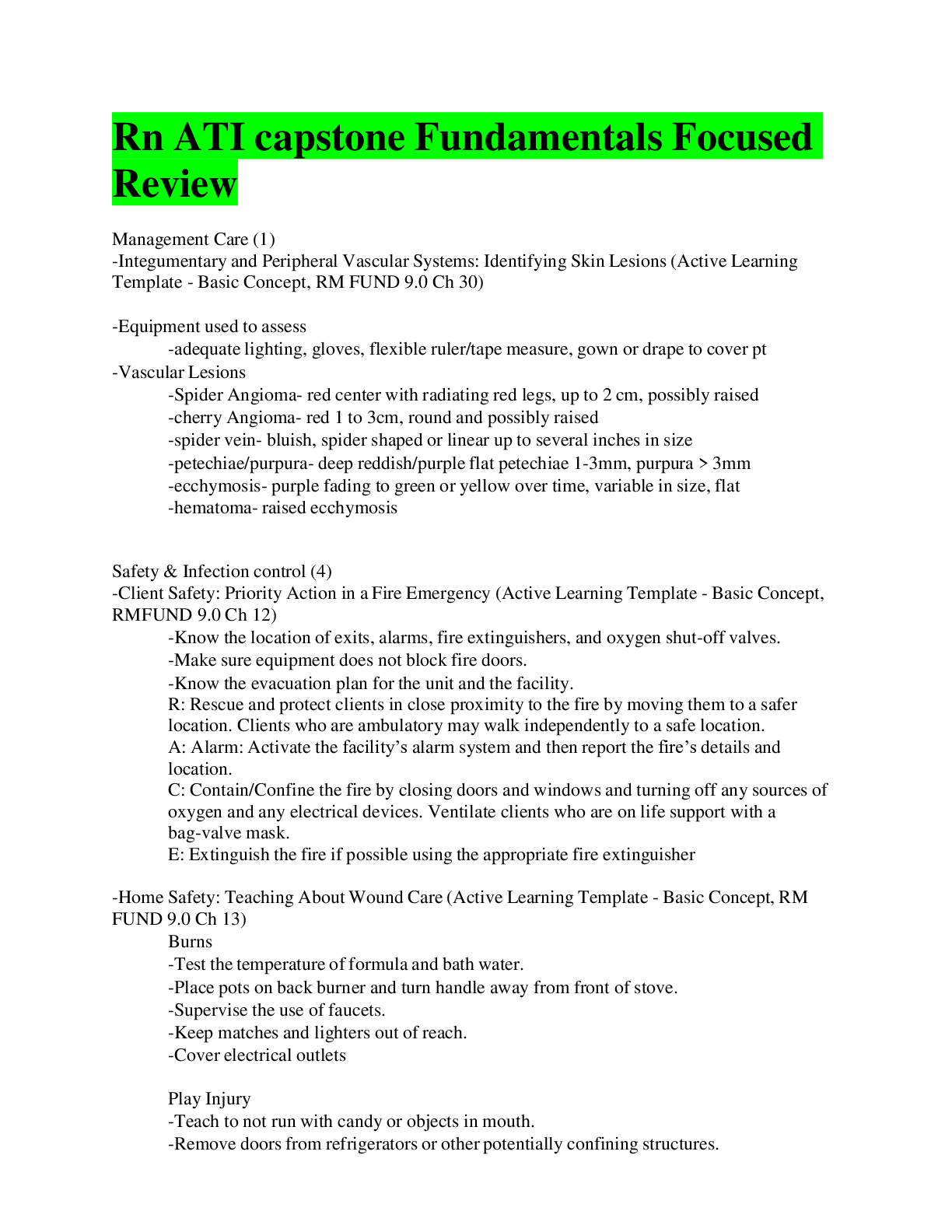
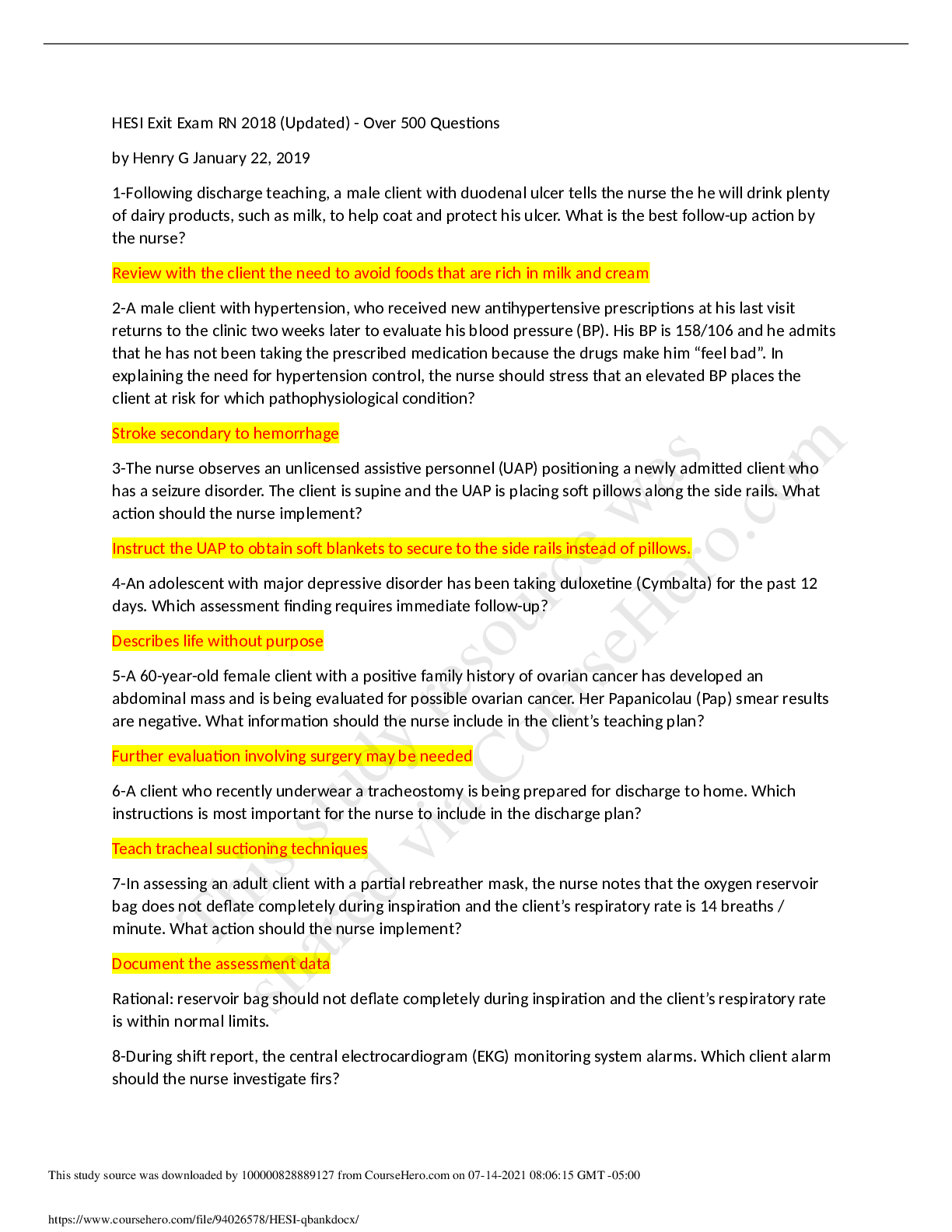
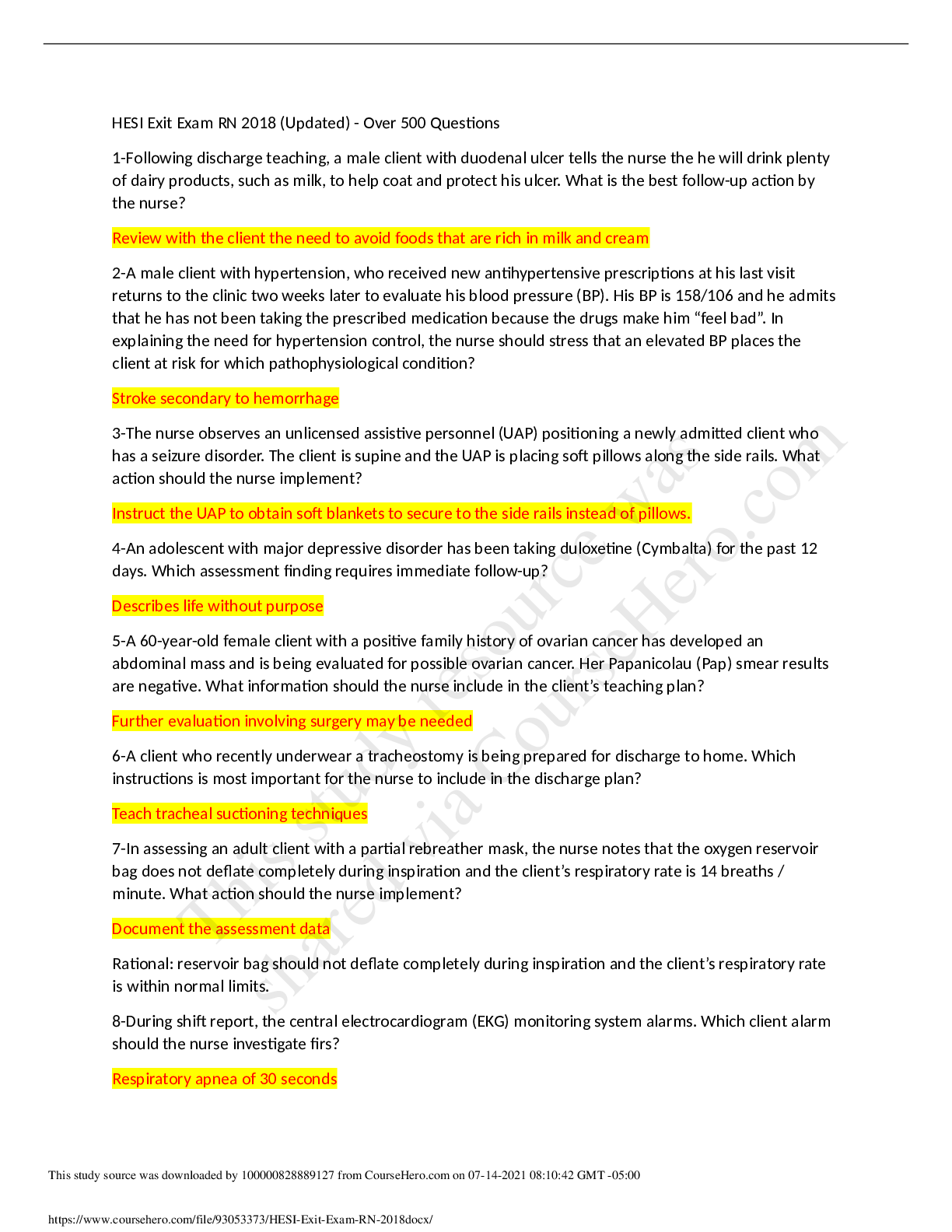
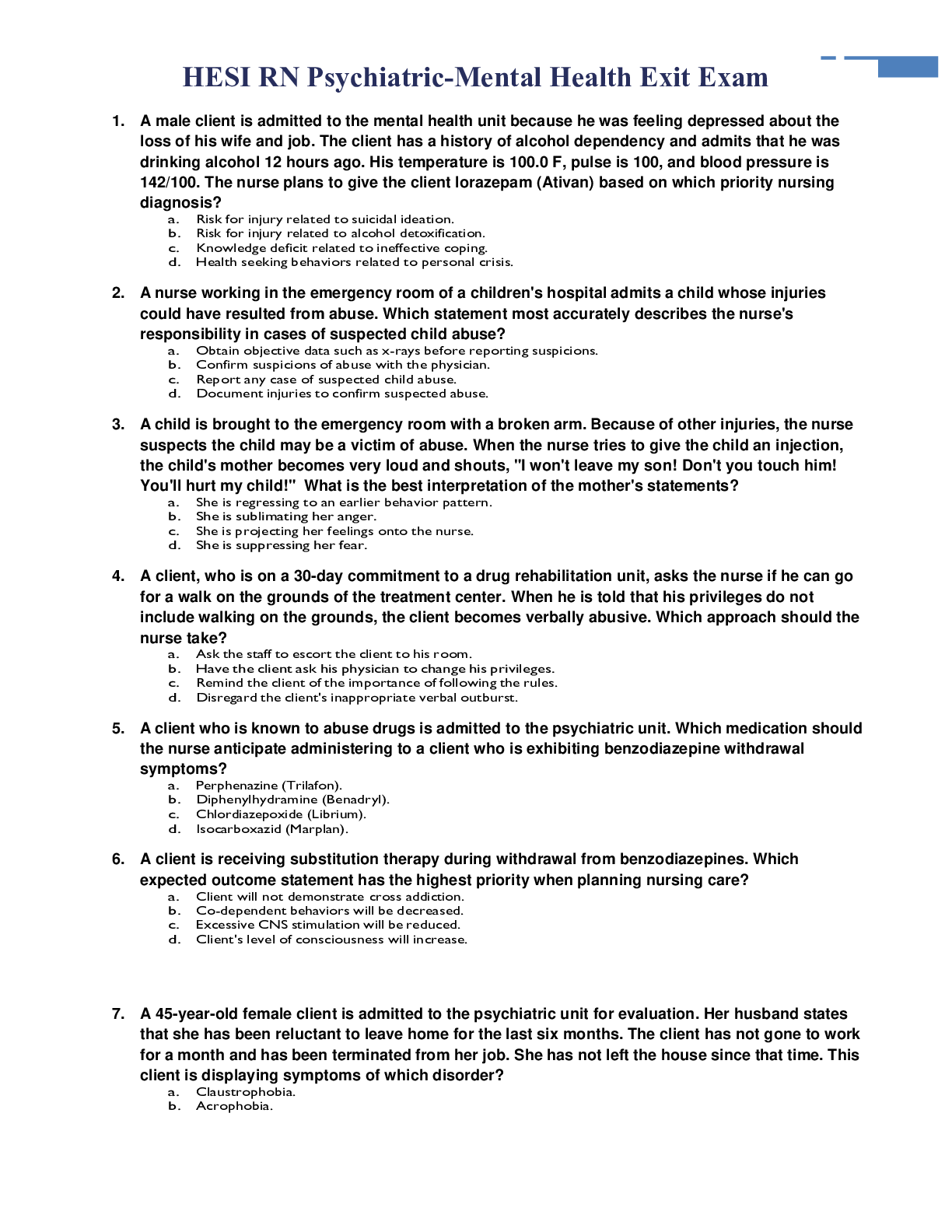
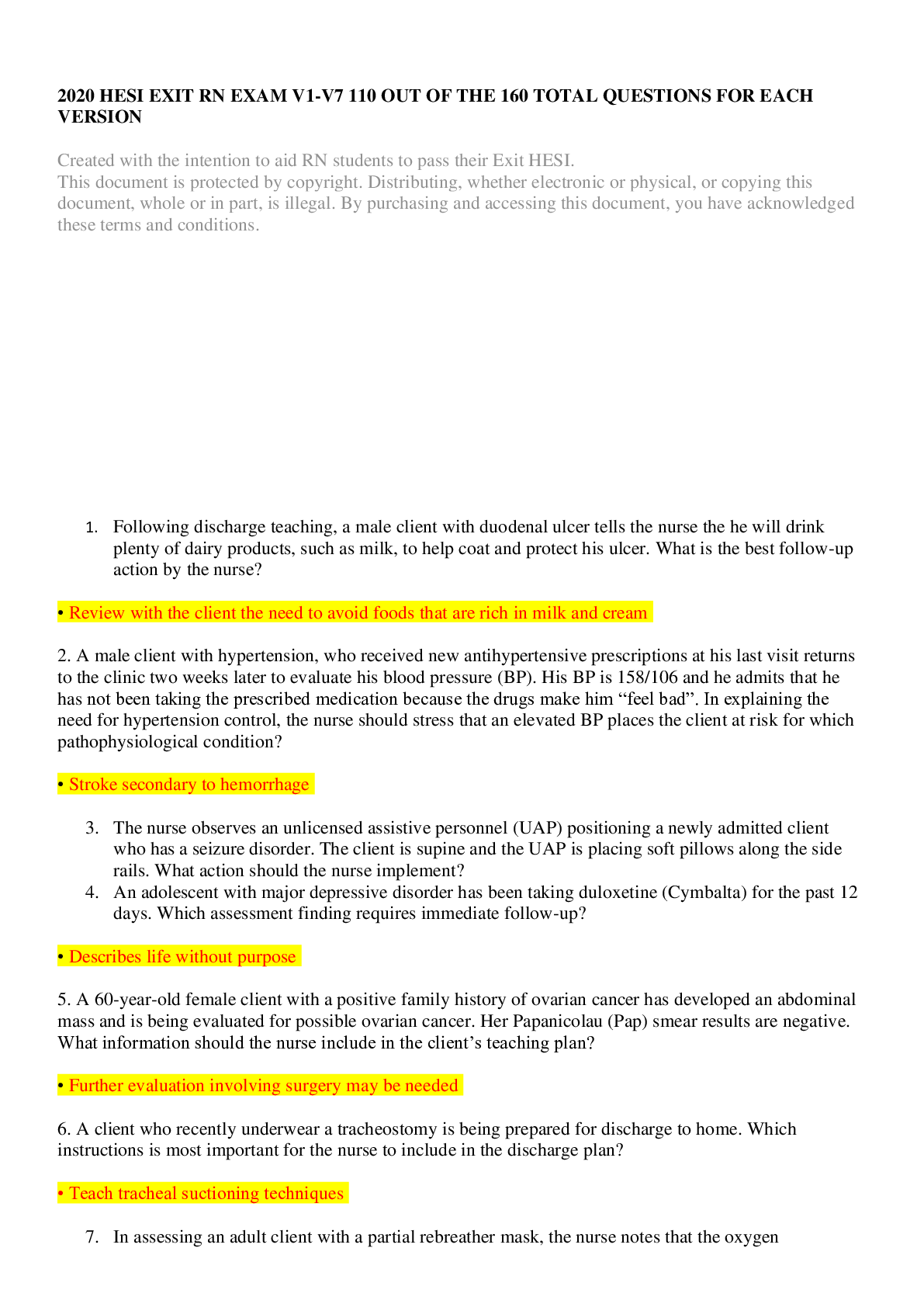
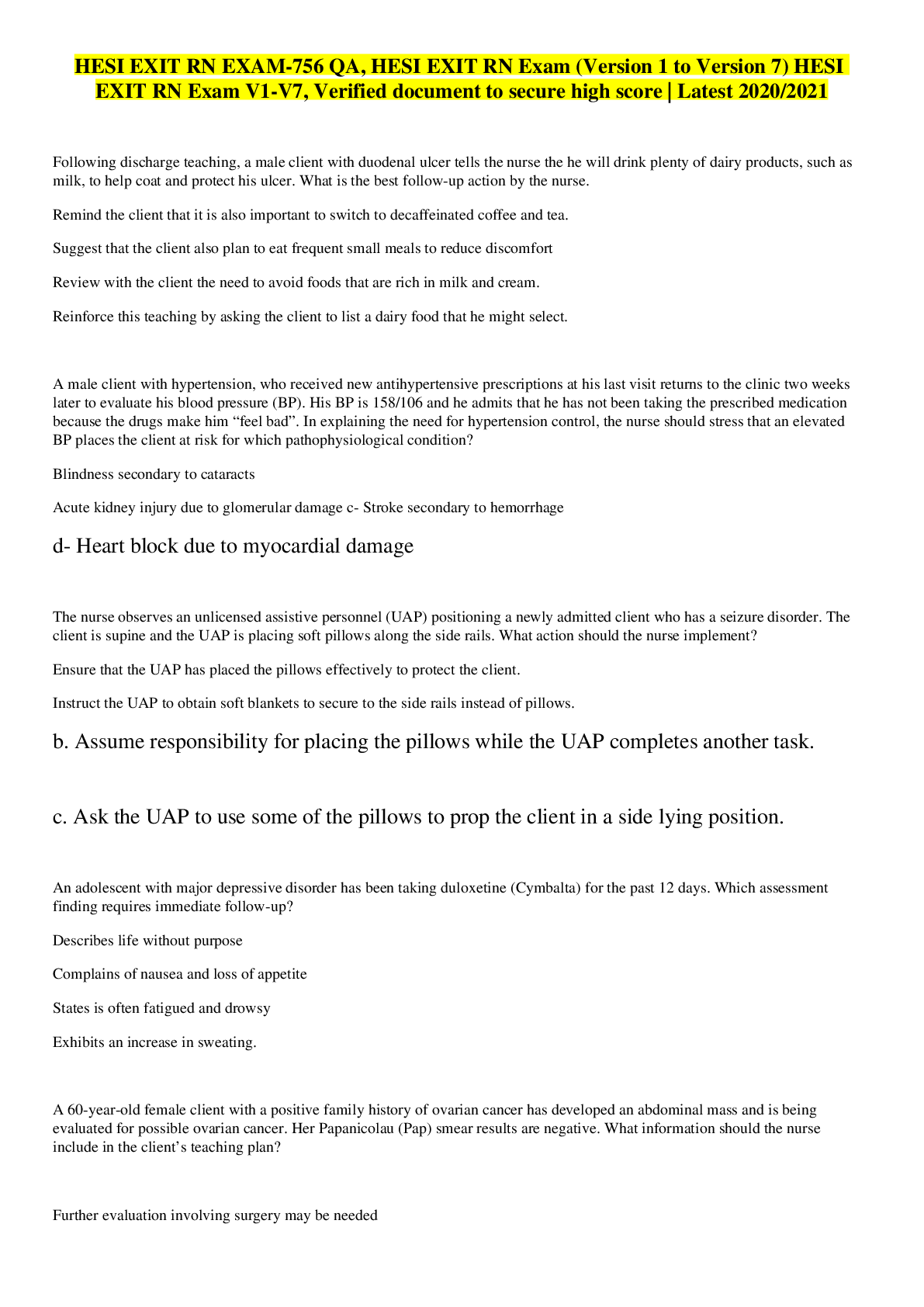
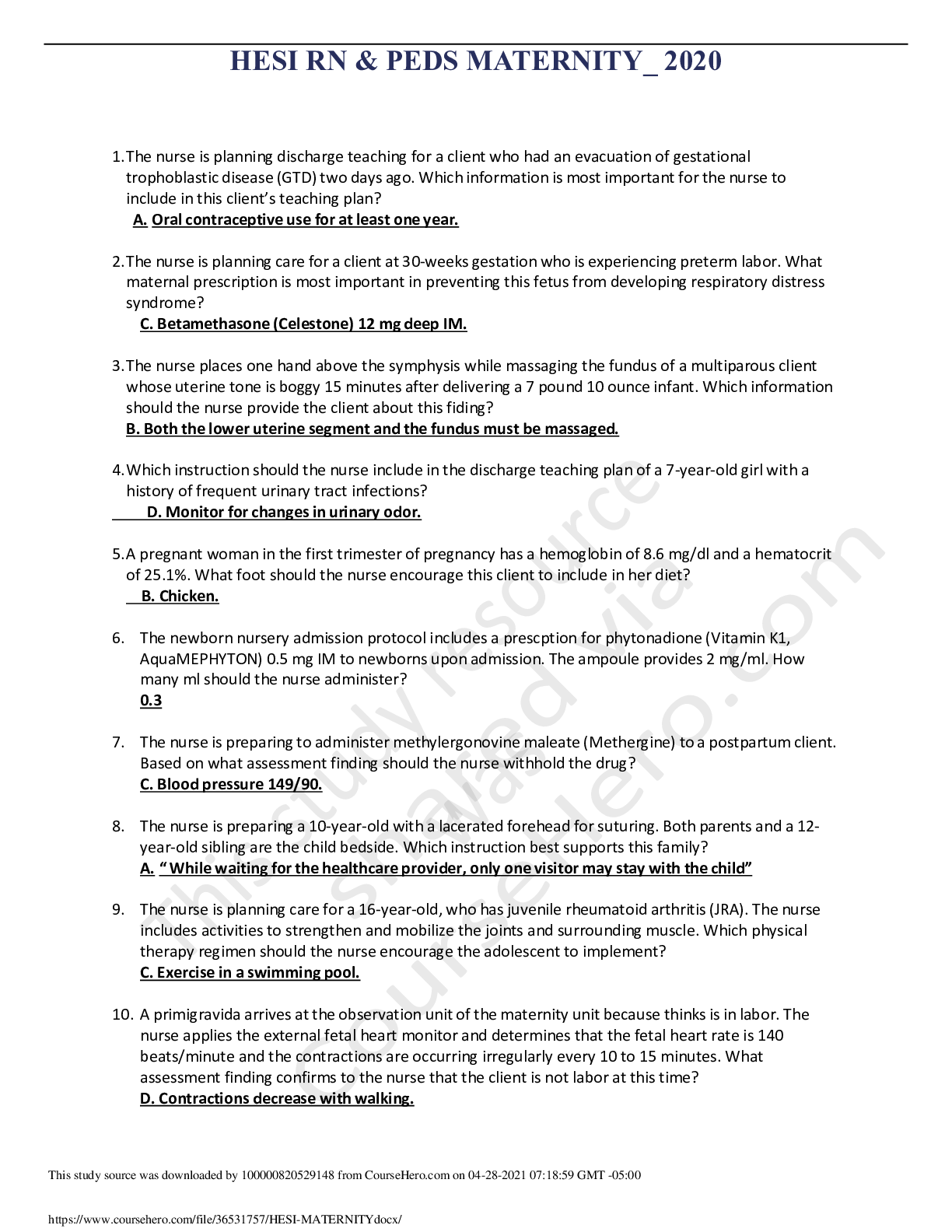
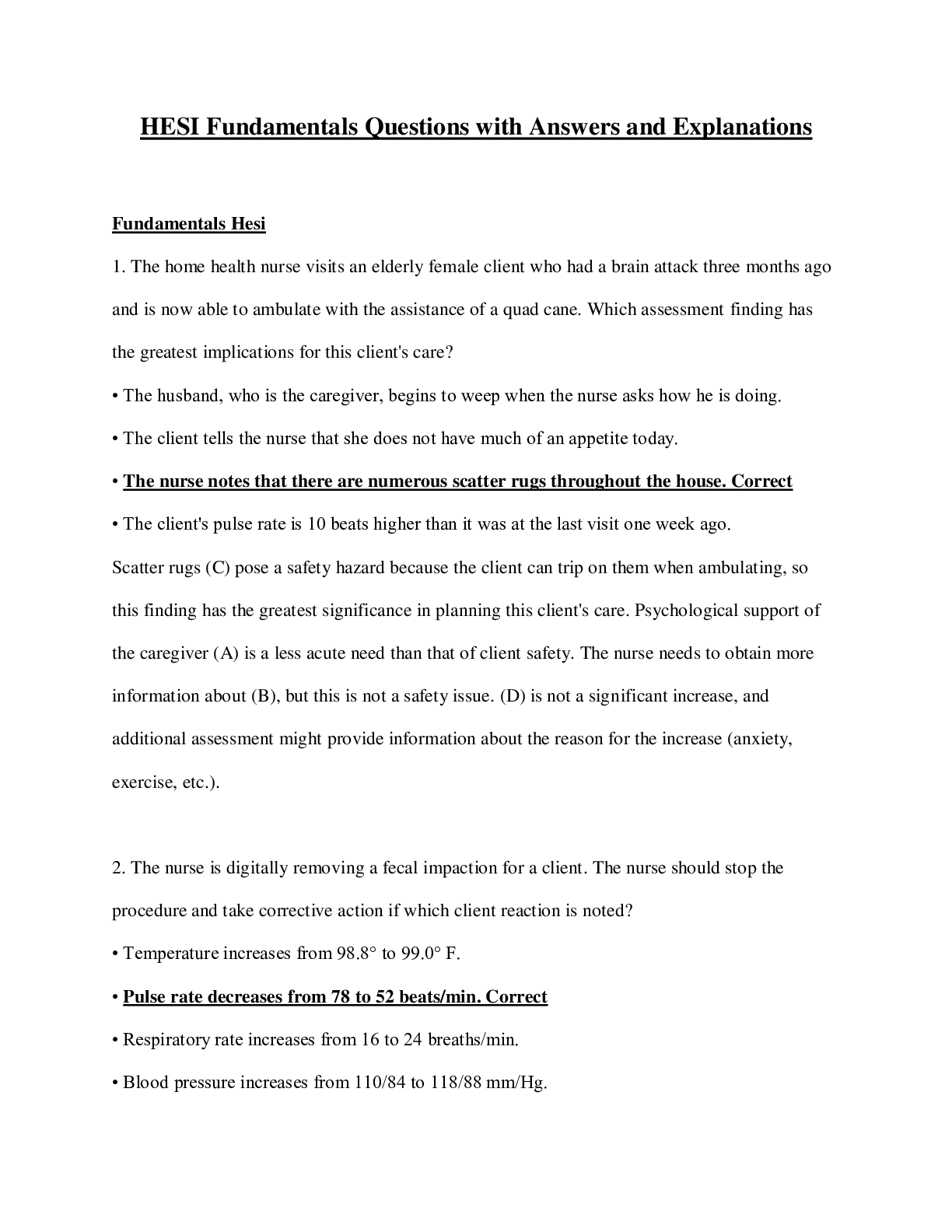
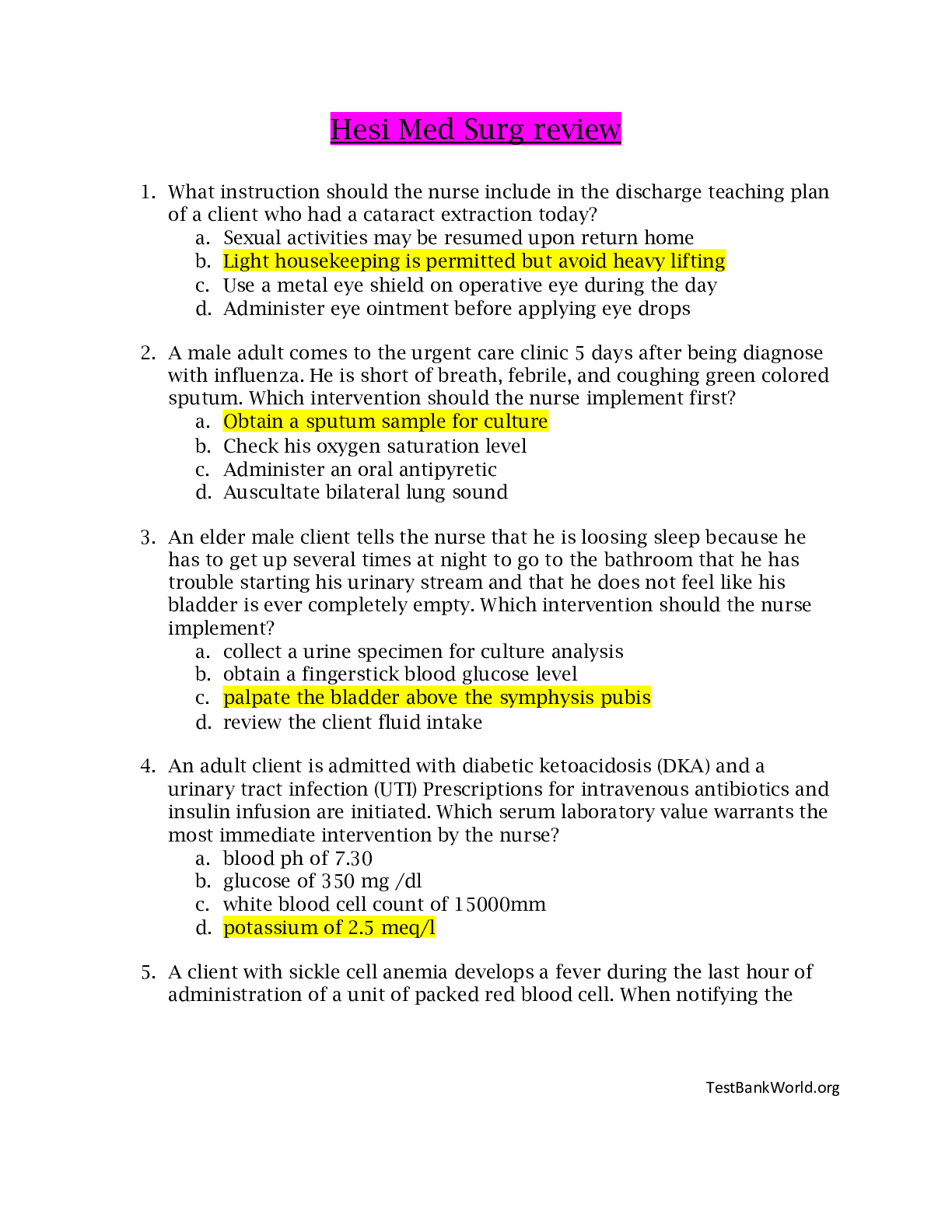
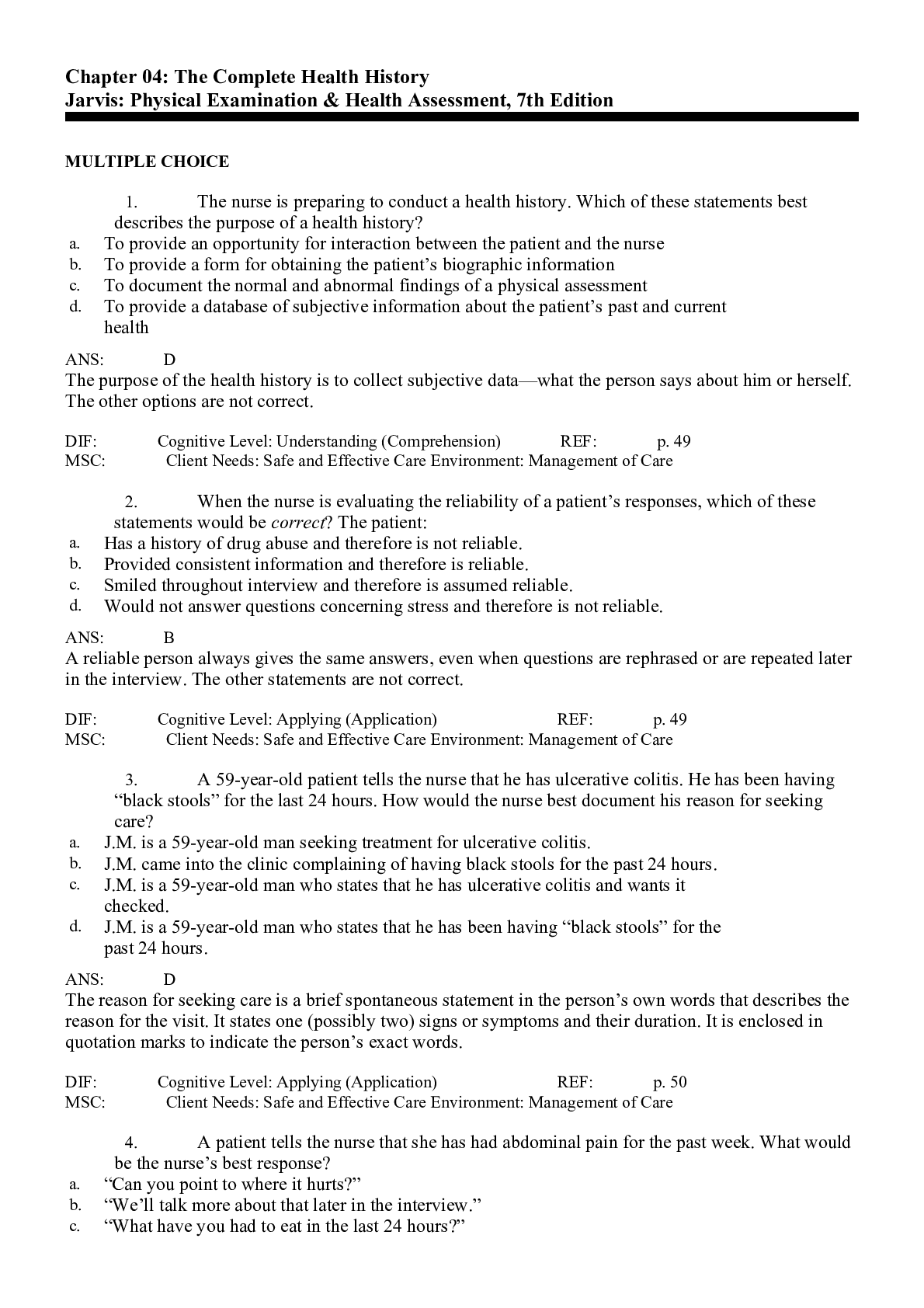
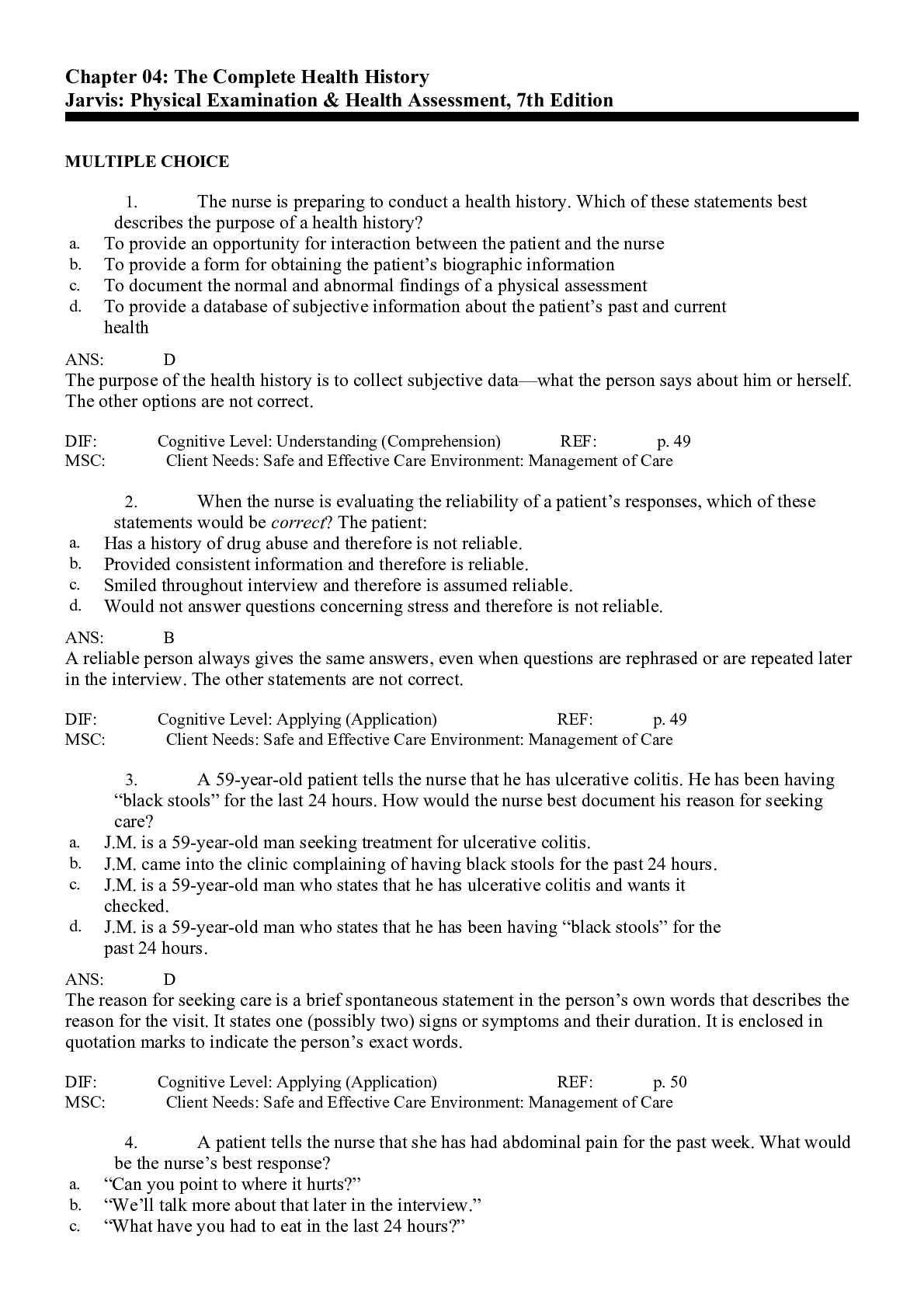

.png)
